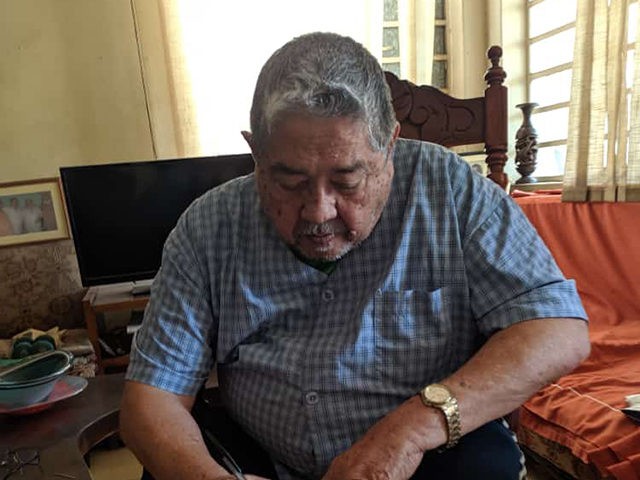Cuban Brigade General Armando Choy Rodríguez died on Monday night, the fifth general on the island to do so since ongoing protests began against the communist regime nationwide on July 11. He was the second Cuban general declared dead on Monday.
Unlike the other four generals, Choy’s death did not make headlines in Communist Party media outlets. According to the independent journalistic outlet Cubanet, the Central University “Marta Abreu” of Las Villas (UCLV), in the heart of Cuba, confirmed his death in a Twitter post on Tuesday.
“Last night, Brigade General Armando Choy Rodríguez, general coordinator of the history group of the combatants of Las Villages, passed away,” the university’s statement read. “We send his family and friends our most sincere condolences.”
The statement did not offer a cause of death or suggest that Choy was battling any significant health problems at the time of his death. Choy was 87 years old and a longtime veteran of Fidel Castro’s pre-revolutionary terrorist organization, the 26 of July Movement, before becoming a formal member of Castro’s military and serving in the imperialist intervention in Angola.
Choy’s death on July 26 corresponded with the anniversary of the 1953 terrorist attack by Castro’s communist forces on the Moncada military barracks in 1953. Castro was arrested for the attack — and delivered his famous “history will absolve me” speech as part of his defense — and sentenced to prison time, but then-President Fulgencio Batista pardoned Castro shortly thereafter, allowing him to return to violence and seize power.
Cuba is currently gripped by a combination of nationwide social unrest and growing alarm over the ever-worsening Chinese coronavirus outbreak on the island. The unrest followed the July 11 protests, which occurred in dozens of cities and consisted almost entirely of peaceful marching through major streets and plazas chanting “freedom!” The most violent documented protest activity was the flipping over of a police car, which did not result in any reported injuries.
In contrast to the peaceful nature of the protests, the Communist Party responded by issuing an “order of combat” demanding that civilians loyal to the Party physically assault suspected dissidents. State security agents began door-to-door raids in some of the nation’s largest cities looking for individuals suspected to have marched in the protests. In areas where crowds gathered to call for an end to the regime, videos smuggled out of the country showed police opening fire at close range on unarmed protesters. Reports of police breaking into homes and shooting unarmed people, in one case in front of young children, grew numerous.
Reports from the island suggest that protesters have continued to attempt to organize peaceful activities against the regime. The Communist Party has shut down access to the internet, however, leaving only VPN access — which was spotty as of Monday. The result has been a significant diminution of content out of the island and extreme difficulty for international journalists to confirm the images or testimonies shared on social media.
As the unrest continues, the Communist Party has largely failed to contain the coronavirus outbreak — which began after the regime increased tourism advertising at the height of the pandemic in 2020, leading to an Italian tourist testing positive for coronavirus in Cuba in March 2020. Case rates have been rising in the past month, however, leading Cuba to break its one-day record of deaths and cases on Sunday: 8,850 cases documented that day and 80 dead of coronavirus infection. Cuba has documented 341,152 coronavirus cases and nearly 2,500 deaths as of Tuesday, though Cuba’s history of falsifying medical statistics has made many question the true toll the pandemic is taking on the country.
The advanced age of the dying generals may suggest pandemic woes, as the elderly are one of the highest-risk demographics for coronavirus infections. Prior to Choy’s death, communist state media announced the death of Reserve Brigade General Manuel Eduardo Lastres Pacheco, another veteran of the 1950s Revolution, on Monday. Reserve Division General Rubén Martínez Puente, 79, reportedly died on Sunday. Last Tuesday, official media reported the death of Reserve Brigade General Marcelo Verdecia, believed to be about 80 years old. The weekend before that, Cuban outlets confirmed the death of the head of the Eastern Army of Cuba, Division General Agustín Peña.
Official sources offered no causes of death for any of the generals. Cuban independent journalists reported the existence of a Facebook post by a friend of Peña’s claiming that he died of a coronavirus infection; Peña, at age 57, was an outlier in the group.
July 26 is typically a major holiday for the communist regime celebrated with nationwide mandatory marches and other mass events. On Monday, however, the regime kept a low profile, holding a memorial service at Fidel Castro’s tomb in Santiago de Cuba and a small meeting between Díaz-Canel and some representatives of the Cuban “youth.” The decision not to organize full-scale celebrations may be a result of the pandemic worsening, but the regime held a very large “act of revolutionary affirmation” the weekend after the July 11 protests with no visible social distancing measures in place. The event attracted a lone protester, Ernesto Frank Sánchez Aguilar, who took advantage of the fact that the regime allowed international journalists to document the event to shout “freedom!” before the cameras. He remains missing at press time.

COMMENTS
Please let us know if you're having issues with commenting.